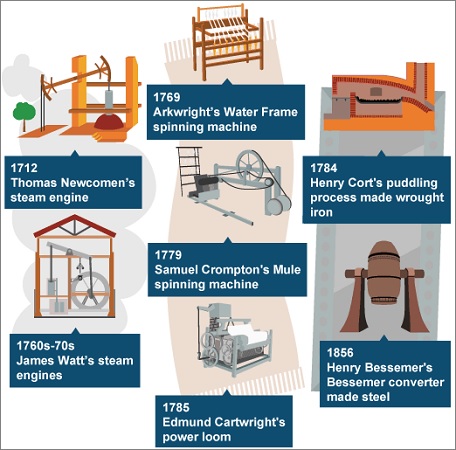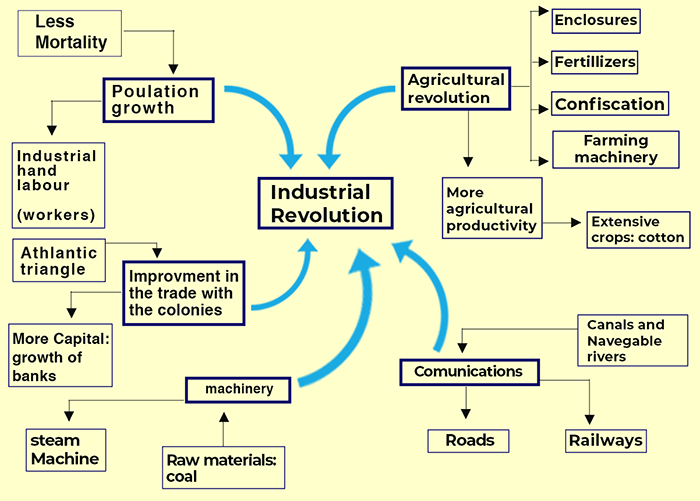Industrial Revolution
by Devender
0 2034
Industrial Revolution is the cycle of progress from an agrarian and craftsmanship economy to one overwhelmed by industry and machine producing. This cycle started in England in the eighteenth century and from that point spread to different pieces of the world and there were reasons for industrial revolution to start from England such as:
- England ended Feudalism and brought rise of capitalism
- It became a democratic country
- It accumulated money from trade all over the world
- England was rich in natural resources like Coal and Iron
- England is an island so it has natural barriers and easy, cheaper transportation of goods and raw material was available.
Industrial revolution brought changes in the mode of production. First, the mode of production was Guild system but when the volume of demand started increasing, this system failed to cope with as it was not ready for mas production of goods.
After guild system failed, Putting-out system came into existence. Under this system, Merchants owned the raw material and final goods, workers were only daily wagers. Workers used to work from their homes.
With new inventions of machines, the Putting-out system was put to rest and everything changed. A new system, Factory system started, which shifted the production from worker's homes to factories. The workers started traveling from their homes to work on daily basis.
- Components of Industrial Revolution:
- It started with Textile industry, development of cotton gin and power loom working on hydropower
- James Watt development of Steam Engine in 1769. It was used to run spinning machines, power looms and pump out water from coal mines.
- Blast furnaces development that helped in utilization of coke instead of charcoal. It helped British Steel industry to manufacture high grade cast iron
- Developments of roads, railways networks and canal network
- Arrival of telegraph and Postal services enabled business transactions to take place from remote locations
- New advanced Farm machinery enabled to grow more cash crops and reduced the need of labour
- Enclosure Movement resulted in availability of a lot of labour for industry
- Impact of Industrial Revolution:
- The economy of Britain was dominated by Industrial sector and not by agricultural sector anymore.
- It boosted the exports of finish material and import of raw material.
- It also helped Urban areas become the centre of production than just trading and administration centres
- Industrial Revolution led to crowding in cities and hence problem of housing and sanitation arose
- Business men only cared about their profits, so the wages of workers were very low
- Women and child labour increased as they were available at low wages
- Working conditions were poor in the factory and nothing was done for social security of workers
- Arising of Industrial Revolution in West
The Enclosure Movement was led by big landlords who were helped by legislators to increase their farmlands by taking over lands of common people and workers.
It resulted in flee of these people towards towns and a lot of people were available as labour for the industry. Due to over-crowding of labour, cheaper labour was available for the industry and hence businessmen were earning more profit.

Positive Impact:
Negative Impact:
This all led to resentment among the workers which was followed by many worker movements. This woke up the government and made them understand that they are accountable to safe the interests of the weaker sections to save capitalism.

Industrial Revolution also increased the interaction between the industrial and non-industrial world. It also increased the demand for raw material and that brought the race to acquire more colonies among European colonial powers. It played a major role in emergence of Imperialism.
After the end of Napoleon wars, European nations had the chance to focus on Industrial revolution. Machines were introduced to all the nations shortly after the wars but for demand of democracy, unification of territories and independence didn't allow to start revolution till 1871.
Russian industrial revolution only boosted after the abolishment of Serfdom in 1861.
Industry in USA started developing after their independence but got boost after 1870.
Japan got industrial revolution in the late 19th century.

Share:







Comments
Waiting for your comments